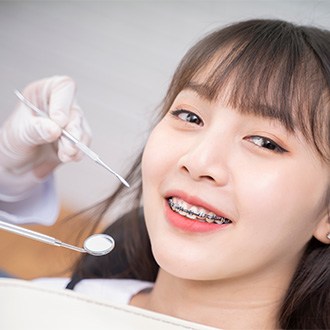Emergency Orthodontist – Webster, MA
How to Effectively Care For Braces-Related Emergencies
From severe tooth pain to soft tissue cuts, dental-related injuries can be painful, anxiety-inducing and inconvenient. Fortunately, orthodontic emergencies are relatively rare, which means you will likely get through your entire treatment without ever experiencing one. However, it is best to be prepared, so that if one does arise, you can swiftly leap into action. With this in mind, keep reading to learn how to effectively care for braces-related emergencies. If you’d prefer to speak directly with our team, don’t hesitate to get in touch!

Why Choose Simply Orthodontics For Emergency Orthodontic Care?
- Team of Talented and Experienced Orthodontists
- Multiple Financial Solutions Available, Including CareCredit
- Morning, Lunchtime, and Afternoon Appointments Available
How To Handle an Orthodontic Emergency

- Give our team a call: Although most orthodontic emergencies are nothing to be alarmed about, it’s best to get in touch with our team so we can get a better understanding of your situation. From there, we can guide you through the next steps (like covering the sharp edge of your braces with dental wax or taking an over-the-counter pain reliever to minimize discomfort) before finding a time for you to come in for a visit.
- See us for treatment: If your orthodontic emergency requires urgent treatment, then we will work with you to find a time to come to our office the very same day. In many cases, however, we can address the root of the problem at your next orthodontic appointment.
- Get the care you need: Fortunately, we’re able to address orthodontic emergencies in an efficient, comfortable, and affordable way. If the situation involved a lost aligner or broken retainer, then we may need to order new parts and schedule a follow-up appointment. In cases where an oral health issue, like a large cavity, is the source, then we will refer you to your general dentist for the necessary care.
The Most Common Orthodontic Emergencies
Whether your orthodontic emergency is relatively minor or one that results in immense pain, it is important to remember that all braces-related injuries require a visit to your orthodontist. Neglecting to seek care when the issue first arises can result in further damage, delaying your treatment timeline significantly. That being said, there are a few actions you can take at home to protect your teeth and gums until your appointment!
Understanding the Cost of Orthodontic Emergencies

It’s natural to have questions about how much you’ll spend to address an orthodontic emergency; however, there’s no “set” cost for these situations, since each one is inherently a little different. When you arrive for your appointment, we will be able to provide you with a detailed estimate based on our findings. From dental insurance and flexible financing to our Preferred Plan, we’re committed to finding an option that fits within your budget and ensures that your treatment is kept right on track. Don’t hesitate to contact our office with any questions!
Every Orthodontic Emergency Is Different

In a perfect world, we’d be able to tell you exactly how much it would cost to treat your situation as soon as you call – but in truth, there’s no way for us to know what’s involved until our expert team has had the chance to look firsthand at your smile. That said, what we can tell you is that some urgent situations end up requiring simple, inexpensive solutions, such as covering up bothersome brackets or wires with orthodontic wax until your next appointment. However, more severe situations, such as broken braces or retainers, may require more complex or involved procedures that increase the amount owed. In any and all cases, we’ll walk you through every treatment option and their costs before proceeding.
Does Dental Insurance Cover Orthodontic Emergencies?

Many insurance providers include some form of coverage for orthodontic emergencies, but since each plan differs, you’ll need to familiarize yourself with the details of your plan so you’ll know for certain if a situation is covered. In a lot of cases, there will be a deductible that needs to have been met before your services kick in, or in other cases, there might be restrictions over what’s covered. If you’re unable to determine what your plan covers on your own, call our office and we’ll get to the bottom of it with you!
Other Options for Making Orthodontic Emergencies More Affordable

We believe that your oral health is an absolute priority, and the last thing we want is for concerns about cost to come between you and getting your smile the help it needs. For patients who lack dental insurance, we’re excited to offer third-party financing through CareCredit. They work with patients to find budget-friendly payment solutions for various forms of treatment, including orthodontic emergency care. We also offer a Preferred Plan which can help make up for the cost of certain emergencies, like lost or worn-out retainers!
Taking Care of Your Smile Can Save You Money

While some orthodontic emergencies are unpredictable, unavoidable, and beyond your control, others can be prevented. For one, keeping up with your routine appointments will lessen the likelihood of you suffering an emergency that sets your treatment back. Likewise, maintaining excellent oral hygiene will reduce the chances of cavities or gum disease forming and causing issues. You should also avoid overly hard or sugary foods that don’t mesh well with orthodontic treatment. You’re always welcome to contact us for additional information about maintaining your orthodontic treatment and avoiding potential emergencies!
How to Prevent Orthodontic Emergencies

While accidents aren’t entirely preventable, many braces-related emergencies are. With this in mind, make sure to abide by the below best practices throughout your treatment:
Attend your adjustment appointments

During your check-in visits at our Webster office, we monitor the movement of your teeth to ensure you’re on-track with your treatment plan. But that’s not all we do! We also take a look at the brackets, wires, and attachments to ensure they are in good condition. If they aren’t, we can quickly remedy the situation, saving you from an emergency visit.
Follow the dietary restrictions

With traditional braces, there are several foods you need to eliminate from your diet, including tortilla chips and hard pretzels. Even with Invisalign, we encourage patients to be mindful of what they eat in an effort to prevent an attachment from breaking or a tooth from developing a cavity. Simply put, the best thing to do is fill up on well-balanced, nutrient-dense, and satiating foods that benefit your oral and overall health.
Implement a solid at-home oral hygiene routine

Taking good care of your smile won’t just benefit your teeth; it will benefit your braces! So, make sure that you’re brushing twice a day, every day (and for two full minutes each time). Additionally, floss each morning or night to remove food particles, plaque, and other debris from between your teeth. If you have traditional braces, consider buying special dental care tools, like pre-threaded floss and an interproximal toothbrush.
Avoid poor dental habits

Do you like to chew on ice? Has biting your nails become a habit? Do you sometimes use your teeth as tools to open things? If so, it’s important that you stop before your brackets, wires, or teeth break under the pressure.
Tip: If you’re having trouble quitting, don’t hesitate to let us know! We’d be happy to provide helpful resources and recommendations to protect both your oral health and your orthodontic treatment.
Wear a mouthguard to protect your smile

Last, but certainly not least, make sure to wear a mouthguard. While this is particularly important if you participate in a contact sport, like football, it’s also encouraged if you prefer a solo one, like riding your bike, running, or lifting weights. That way, both your teeth and your braces are protected from unforeseen impact.
Important note: If you don’t have a mouthguard that fits over your braces, let us know! We can have one custom-made for you, ensuring it protects your smile without feeling uncomfortable.
If you have any further questions about orthodontic emergencies or would like to schedule an appointment, contact our office today!
Orthodontic Emergency FAQs
Will my toothache go away on its own?
Normally, the answer is “no.” However, it’s common for discomfort to arise from time-to-time during the teeth-straightening process. So, there’s a chance that your toothache will go away as your teeth adjust to the pressure from your braces. That said, you shouldn’t hesitate to reach out to us if the sensation seems to be getting worse or is present in tandem with other abnormal dental symptoms, like bleeding gums.
How should I sleep with tooth pain?
As we mentioned above, some tooth pain is to be expected during your orthodontic treatment. The good news is that it’s only temporary, and there are several ways you can alleviate it even sooner. The first is sticking to soft foods, like applesauce, yogurt, and oatmeal. The second is sipping on cool water to help provide a slight numbing sensation and soothe any inflammation. The third is taking OTC pain medication as directed on the label.
Should I visit the emergency room first for orthodontic emergencies?
Since hospitals don’t usually have dentists or orthodontists on-staff, it’s only recommended if you’re experiencing potentially life-threatening symptoms (i.e., severe swelling, uncontrollable bleeding, trouble swallowing). If your bracket is loose, a wire is out of place, or you can’t find your retainer, then your first call should be to our office. Once we know a little more about your situation, we can schedule a time for you to come in, hopefully the same day!
What should I keep in my emergency dentistry kit?
Just like you have a First-Aid kit for cuts and other injuries, you should have an emergency dentistry kit for damage to the teeth and gums. If you don’t have one already, then fill up a backpack or small container with the following:
- Dental wax
- Additional orthodontic supplies, like rubber bands
- Sterile gloves (ideally nitrile)
- Gauze pads and dressings
- Cotton balls
- Dental cement (or other temporary filling material)
- Anti-inflammatories such as ibuprofen
- Topical anesthetic such as Orajel or a similar product
- Floss
- Ice pack
We also recommend keeping our phone number and address in this kit so that it’s easily accessible should you need it.
Are toothpicks safe to use?
Toothpicks can be used, but only with the utmost caution. After all, accidentally swallowing one can be deadly. That’s why we always recommend taking a different approach. First, rinse your mouth with warm saltwater (this will help loosen the debris). Then, use pre-threaded floss or a water flosser to remove the debris.
Traditional Braces Clear Braces Self-Ligating Braces Invisalign Pediatric Orthodontics Adult Orthodontics Dentofacial Orthopedics View Our Services
